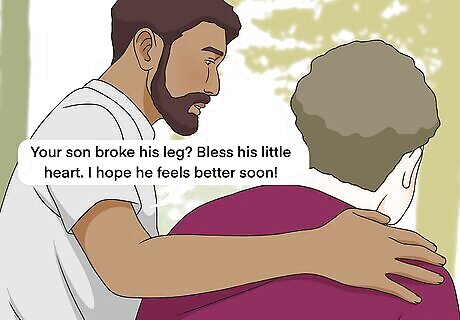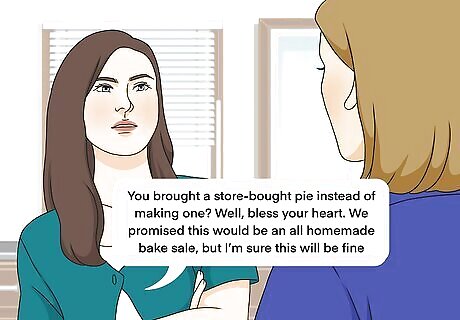
views
What does “bless your heart” mean?

Bless your heart is often used to sincerely express sympathy. Commonly used in the southern United States, this phrase can be used sincerely if something bad has happened and a person wants to give their love and blessings. For example, you might say “Bless your heart” to someone who just lost their job if you want to be sympathetic. The best way to tell if someone is using the phrase sincerely is to consider the situation. If you’re dealing with a serious problem in which people usually express their sympathy, it’s probably sincere. Pay attention to the speaker’s tone and body language, too. If they look and sound genuinely upset or concerned, they’re likely being truly empathetic.

The phrase is also used to sarcastically express pity or judgment. Because Southerners value manners, one may say “Bless your heart” instead of insulting someone directly. Consider using the phrase when you want to say something judgmental or mean but don’t want to seem impolite. Some say “Bless your heart” is the polite way of saying “You’re an idiot.” For example, you might use the phrase when someone does something without thinking, like burning their finger on a hot plate after being warned it was too hot. This might be accompanied with a sarcastic shake of your head. To determine if someone is using the phrase sarcastically, consider the situation. You may say “Bless your heart” after someone tells a funny story in which they did something foolish, or when someone is completely oblivious to the mistakes they’re making. Look out for body language, too, like someone shaking their head or rolling their eyes.

The phrase can also express thanks or congratulations. If someone did something particularly kind for you, you might say “Bless your heart” to thank them. You can also say it if something lucky happened to someone and you want to express your well wishes and affection. For example, if someone baked you a cake for your birthday, you might say “Bless your heart. You didn’t have to do that!” Or, if someone just announced their pregnancy, you could say “Bless your heart! That’s just wonderful!”
How to Use Bless Your Heart in Conversation

Use it empathetically after someone tells you bad news. While the phrase has gained a reputation for being sarcastic, it’s actually more commonly used to sincerely express sympathy or condolences. If someone tells you they’re going through a tough time, say “Bless your heart” to let them know you’re there for them. Here are some examples: “Your son broke his leg? Bless his little heart. I hope he feels better soon!” “Susan just got laid off. Bless her heart. I told her to let me know if there’s anything I can do to help.” “I heard you were sick. Bless your heart! Don’t worry, I’m on my way over with some soup.”

Say “Bless your heart” to let someone know you’re happy for them. Because this phrase’s meaning depends on the tone in which you use it, it can also express joy and excitement. You might use it when someone tells you big, happy news. Here are some examples: “You got the promotion? Bless your heart, congratulations! You’ve been wanting this for so long!” “He proposed? Bless your heart! It’s about time. Congratulations!” “You got accepted into your dream college? Bless your heart! I’m so happy for you. You’ve worked so hard!”

Let someone know you’re disappointed in them or their choices. In the South, many people value politeness over speaking your mind. Instead of calling someone out for doing something reckless or silly, you might shake your head and mutter “Bless your heart” to let them know you don’t approve. Take a look at these examples: “You’re telling me you spent that much money on a concert ticket? Bless your heart.” “Honey, do you really think buying a motorcycle is a good idea? Bless your heart.” “Bless your heart. Why on Earth would you do that?”

Use it when you want to be mean but need to be polite. We all have moments when we want to tell someone off, but depending on the situation, that’s not always the best idea. If someone upsets you, you can say “Bless your heart” to passively (or passive aggressively) let them know you’re upset while preventing the situation from escalating. Here are some examples: “You’re going to be late again? Well, bless your heart. It seems like something always comes up. I guess we’ll manage.” “You brought a store-bought pie instead of making one? Well, bless your heart. We promised this would be an all homemade bake sale, but I’m sure this will be fine.” “He forgot about the presentation, so I basically had to do it all myself. Bless his heart. He’d forget his head if it wasn’t attached.”
How to Respond to Bless Your Heart

Say “thank you” if the speaker is sincere. If someone says “Bless your heart” to you after you tell them something important, they’re likely being sincere. Whether they’re expressing sympathy for a tough situation or congratulating you on exciting news, it’s best to respond with a “thank you.” And since you’re probably speaking to a Southerner, it won’t hurt to add a “sir” or “ma’am” to the end of the phrase! In general, you only need to add the “sir” or “ma’am” if the speaker is older than you and/or someone you don’t know well. You don’t have to worry about this if they’re a close friend. If the speaker says “Bless my heart,” referring to themselves, it may reflect self-sympathy or self-deprecation. You may give them a sympathetic nod or offer a concerned “Bless your heart” in return. Just make sure your tone sounds sincere!

Smile and change the subject if it’s sarcastic. If you sense judgment in the speaker’s voice, you may be tempted to say something snarky in response, but that’s usually not the best idea. Since they didn’t technically say anything rude, you risk coming off as the impolite one if you respond sarcastically. Instead, you might want to smile and nod. Change the subject or remove yourself from the situation, if necessary. You can also opt to laugh it off to let them know you’re not bothered by their judgment. If they’re saying “Bless your heart” about someone else, they may want to gossip. You can decide if this is something you want to participate in, but if you don’t, just give a smile or light chuckle and change the subject.
Other Common Southern Phrases

Learn other Southern slang so you don’t get confused. If you’re visiting or moving to the South, you might hear people say things you’ve never heard before, and you’ll probably wonder what they mean. Luckily, unlike “Bless your heart,” most of these phrases only have one meaning. Here are a few other Southern phrases and what they mean: I reckon: “Reckon” is a verb that can take the place of “think,” “suppose,” or “assume.” For example, you might say, “I reckon it’s about to rain.” Fixin’ to: “Fixin’ to” is a phrase that means “about to” or “going to.” For example, “I’m fixin’ to go to the store. You need anything?” Yonder: “Yonder” refers to a place in the distance. Instead of saying “over there,” you might say “over yonder.” For example, “Are y’all going over yonder to Dan’s house?” If I had my druthers: This phrase means “If I had things my way.” For example, “If I had my druthers, I’d be at home watching the football game right now.” Madder than a wet hen: This phrase means someone is very angry. For example, “Your mama’s gonna be madder than a wet hen when she finds out you broke that vase.”




















Comments
0 comment